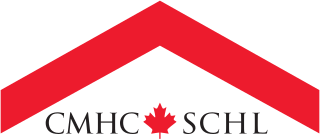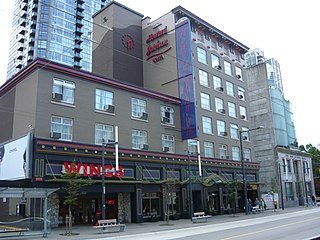Related Research Articles

Redlining is a discriminatory practice in which services are withheld from potential customers who reside in neighborhoods classified as "hazardous" to investment; these neighborhoods have significant numbers of racial and ethnic minorities, and low-income residents. While the best-known examples involve denial of credit and insurance, also sometimes attributed to redlining in many instances are denial of healthcare and the development of food deserts in minority neighborhoods. In the case of retail businesses like supermarkets, the purposeful construction of stores impractically far away from targeted residents results in a redlining effect.

Debt is an obligation that requires one party, the debtor, to pay money borrowed or otherwise withheld from another party, the creditor. Debt may be owed by sovereign state or country, local government, company, or an individual. Commercial debt is generally subject to contractual terms regarding the amount and timing of repayments of principal and interest. Loans, bonds, notes, and mortgages are all types of debt. In financial accounting, debt is a type of financial transaction, as distinct from equity.

A mortgage is a legal instrument of the common law which is used to create a security interest in real property held by a lender as a security for a debt, usually a mortgage loan. Hypothec is the corresponding term in civil law jurisdictions, albeit with a wider sense, as it also covers non-possessory lien.

This aims to be a complete list of the articles on real estate.

Foreclosure is a legal process in which a lender attempts to recover the balance of a loan from a borrower who has stopped making payments to the lender by forcing the sale of the asset used as the collateral for the loan.
A reverse mortgage is a mortgage loan, usually secured by a residential property, that enables the borrower to access the unencumbered value of the property. The loans are typically promoted to older homeowners and typically do not require monthly mortgage payments. Borrowers are still responsible for property taxes or homeowner's insurance. Reverse mortgages allow older people to immediately access the home equity they have built up in their homes, and defer payment of the loan until they die, sell, or move out of the home. Because there are no required mortgage payments on a reverse mortgage, the interest is added to the loan balance each month. The rising loan balance can eventually grow to exceed the value of the home, particularly in times of declining home values or if the borrower continues to live in the home for many years. However, the borrower is generally not required to repay any additional loan balance in excess of the value of the home.
A home equity line of credit, or HELOC, is a revolving type of secured loan in which the lender agrees to lend a maximum amount within an agreed period, where the collateral is the borrower's property. Because a home often is a consumer's most valuable asset, many homeowners use their HELOC for major purchases or projects, such as home improvements, education, property investment or medical bills, and choose not to use them for day-to-day expenses.
A collateralized debt obligation (CDO) is a type of structured asset-backed security (ABS). Originally developed as instruments for the corporate debt markets, after 2002 CDOs became vehicles for refinancing mortgage-backed securities (MBS). Like other private label securities backed by assets, a CDO can be thought of as a promise to pay investors in a prescribed sequence, based on the cash flow the CDO collects from the pool of bonds or other assets it owns. Distinctively, CDO credit risk is typically assessed based on a probability of default (PD) derived from ratings on those bonds or assets.
An asset-backed security (ABS) is a security whose income payments, and hence value, are derived from and collateralized by a specified pool of underlying assets.

Canada Mortgage and Housing Corporation is Canada's federal crown corporation responsible for administering the National Housing Act, with the mandate to improve housing by living conditions in the country.
A mortgage broker acts as an intermediary who brokers mortgage loans on behalf of individuals or businesses. Traditionally, banks and other lending institutions have sold their own products. As markets for mortgages have become more competitive, however, the role of the mortgage broker has become more popular. In many developed mortgage markets today,, mortgage brokers are the largest sellers of mortgage products for lenders. Mortgage brokers exist to find a bank or a direct lender that will be willing to make a specific loan an individual is seeking. Mortgage brokers in Canada are paid by the lender and do not charge fees for good credit applications. In the US, many mortgage brokers are regulated by their state and by the CFPB to assure compliance with banking and finance laws in the jurisdiction of the consumer. The extent of the regulation depends on the jurisdiction.

Second mortgages, commonly referred to as junior liens, are loans secured by a property in addition to the primary mortgage. Depending on the time at which the second mortgage is originated, the loan can be structured as either a standalone second mortgage or piggyback second mortgage. Whilst a standalone second mortgage is opened subsequent to the primary loan, those with a piggyback loan structure are originated simultaneously with the primary mortgage. With regard to the method in which funds are withdrawn, second mortgages can be arranged as home equity loans or home equity lines of credit. Home equity loans are granted for the full amount at the time of loan origination in contrast to home equity lines of credit which permit the homeowner access to a predetermined amount which is repaid during the repayment period.
Equity release is a means of retaining use of a house or other asset which has capital value, while also obtaining a lump sum or a steady stream of income, using the value of the asset. It is also possible to make multiple withdrawals with equity release instead of just unlocking one big lump sum.

A mortgage loan or simply mortgage, in civil law jurisdictions known also as a hypothec loan, is a loan used either by purchasers of real property to raise funds to buy real estate, or by existing property owners to raise funds for any purpose while putting a lien on the property being mortgaged. The loan is "secured" on the borrower's property through a process known as mortgage origination. This means that a legal mechanism is put into place which allows the lender to take possession and sell the secured property to pay off the loan in the event the borrower defaults on the loan or otherwise fails to abide by its terms. The word mortgage is derived from a Law French term used in Britain in the Middle Ages meaning "death pledge" and refers to the pledge ending (dying) when either the obligation is fulfilled or the property is taken through foreclosure. A mortgage can also be described as "a borrower giving consideration in the form of a collateral for a benefit (loan)".
This article provides background information regarding the subprime mortgage crisis. It discusses subprime lending, foreclosures, risk types, and mechanisms through which various entities involved were affected by the crisis.

Ocwen Financial Corporation is a provider of residential and commercial mortgage loan servicing, special servicing, and asset management services, which has been described as "debt collectors, collecting monthly principal and interest from homeowners". Ocwen was founded in 1988 by William Erbey and is headquartered in West Palm Beach, Florida, with additional offices in Mount Laurel, NJ, Rancho Cordova, California, and St. Croix, U.S. Virgin Islands. It also has support operations in the Philippines and India. Ocwen's Slogan is "Helping Homeowners Is What We Do."
Securitization is the financial practice of pooling various types of contractual debt such as residential mortgages, commercial mortgages, auto loans or credit card debt obligations and selling their related cash flows to third party investors as securities, which may be described as bonds, pass-through securities, or collateralized debt obligations (CDOs). Investors are repaid from the principal and interest cash flows collected from the underlying debt and redistributed through the capital structure of the new financing. Securities backed by mortgage receivables are called mortgage-backed securities (MBS), while those backed by other types of receivables are asset-backed securities (ABS).

Affordable housing in Canada is living spaces that are deemed financially accessible to those with a median household income in Canada. The property ladder continuum of affordable housing in Canada includes market, non-market, and government-subsidized housing.
Equitable Bank is a Canadian bank that specializes in residential and commercial real estate lending, as well as personal banking through its digital arm, EQ Bank. Founded in 1970 as The Equitable Trust Company, it became a Schedule I Bank in 2013 and has since grown to become Canada's seventh largest bank by assets.
The Canadian property bubble refers to a significant rise in Canadian real estate prices from 2002 to present which some observers have called a real estate bubble. The Dallas Federal reserve rated Canadian real estate as "exuberant" beginning in 2003. From 2003 to 2018, Canada saw an increase in home and property prices of up to 337% in some cities. In 2016, the OECD warned that Canada's financial stability was at risk due to elevated housing prices, investment and household debt. By 2018, home-owning costs were above 1990 levels when Canada saw its last housing bubble burst. Bloomberg Economics ranked Canada as the second largest housing bubble across the OECD in 2019 and 2021. Toronto scored the highest in the world in Swiss bank UBS' real estate bubble index in 2022, with Vancouver also scoring among the 10 riskiest cities in the world. By 2023 Canada’s nonfinancial debt exceeded 300% of GDP and household debt surpassed 100% of GDP, both higher than the levels seen in the United States before the 2008 global financial crisis.
References
- ↑ Randall, Steve. "HomeEquity Bank reports 26% rise in reverse mortgage originations". Which Mortgage Canada. Retrieved 2019-11-06.
- ↑ Singh, Ajay. "The 2022 Canadian Reverse Mortgage Market: A Year of Significant Growth". RetireBetter.
- 1 2 "Equitable Bank takes on CHIP, enters reverse mortgage world", Financial Post, Barry Critchley, January 22, 2018
- ↑ "HOMEQ Corporation Closes Arrangement with Birch Hill Equity Partners – Birch Hill". www.birchhillequity.com. Retrieved 2024-01-05.
- ↑ Patricia Meredith; James L. Darroch (2017). Stumbling Giants: Transforming Canada's Banks for the Information Age. University of Toronto Press. p. 218. ISBN 978-1-4426-4951-4.
- ↑ "The give and take of reverse mortgages: Cash in your hands while your home equity gets eaten way". The Globe and Mail, Rob Carrick, October 24, 2019
- ↑ "Canadians collectively owe $1.8 trillion in household debt A 6% increase from one year ago". MoneySense, Mar 12, 2018
- ↑ "Yvonne Ziomecki from HomeEquity Bank explains why the bank decided to shake things up after 32 years". www.mortgagebrokernews.ca. Retrieved 2019-11-06.
- ↑ "Don't-pay-til-you-die reverse mortgages are booming in Canada as seniors binge on debt ". Financial Post, September 16, 2019. Chris Fournier and Paula Sambo
- ↑ "Finally, the cost of getting a reverse mortgage in Canada is getting cheaper". Robert McLister, The Globe and Mail, December 10, 2019
- ↑ "Posthaste: Trump's 'monster' deal with China may ignite another rally — but markets remain vulnerable". Financial Post, January 15, 2020, Yadullah Hussain
- ↑ "Ontario Teachers' announces completion of its acquisition of HomeEquity Bank". Bloomberg.com. 2022-07-04. Retrieved 2023-08-10.